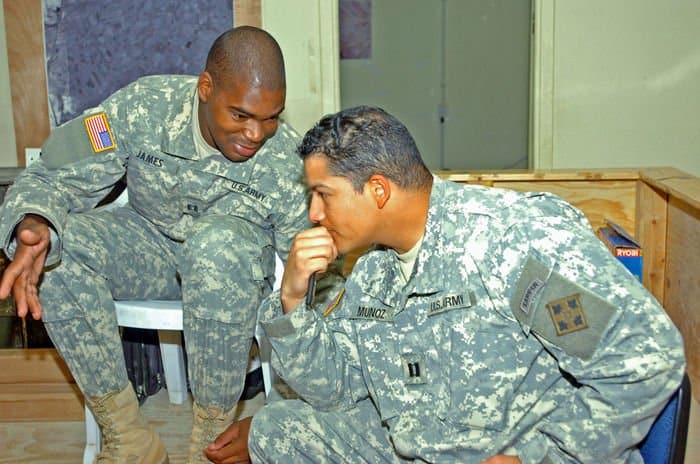By Spc. Lee Elder, 133rd Mobile Public Affairs Detachment

KIRKUSH, Iraq – Helping the Iraqi security forces and local governments work together to defeat the insurgent threat and improve the lives of ordinary Iraqis has been the greatest accomplishment of the outgoing unit here according to its commander.
After just two months manning the coalition site at Kirkush Military Training Base, a 40-man cell from 3rd Special Troops Battalion, 3rd Heavy Brigade Combat Team, is preparing to return to its home base at Forward Operating Base Warhorse. The cell gave way to 5th Squadron, 73rd Cavalry, 3rd Brigade Combat Team, 82nd Airborne Division, based out of Fort Bragg, N.C.
As he prepares to leave Kirkush, Lt. Col. Leonard Wells, who commands 3rd STB, said he is proud of his unit’s efforts here. He said he believed that despite its relatively short stay the 3rd STB was able to make a difference.

“We were able to do a lot for providing coalition effects for the Iraqi Army,” Wells said. “We were able to assist them with EOD assets, help them in their targeting of the AIF and in the use of MEDEVAC.
“They don’t have any of that in the Iraqi Army.”
Using their own efforts combined with Military and Border Training teams, Wells said 3rd STB has helped give the local Iraqi Army more specialized training in key areas. There are now separate military police, military intelligence, signal and bomb disposal companies which are becoming more proficient and aiding the IA in its quest to rid eastern Diyala Province of the insurgent threat.
“We were able to partner with them and conduct outside-the-FOB missions,” Wells said. “We had actual combat missions.
“We were able to train them inside the wire and were able to conduct combat operations.”
During these operations, 3rd STB was able to provide infantry and transportation support. They also provided assessments and evaluations when the missions were completed.
During the rotation, Wells said he had hoped to have had a platoon of military police to help train local Iraqi Police, but they were diverted to Baghdad. However, he has able to secure the services of four International Police Liaison Officers. These officers observed and evaluated their local Iraqi counterparts and made recommendations for improvement.
The last link in the chain was the local Iraqi governments. Wells said he developed a plan modeled after the one used by the 3rd HBCT to work with area municipalities.
Agriculture was a major component in this plan. It drives the local economies.
“We are trying to improve the economy in the local area by allowing farmers to produce more, which means they can sell more and produce more income,” Wells said. “Potentially, they can hire more workers as their productivity increases.”
To that end, there are 32 water well projects nearing completion in eastern Diyala Province. Work has also been done to clean out water canals that have been congested with various debris and trash.
“A lot of those canals are choked with weeds,” Wells said. “They haven’t been cleaned out which drastically cuts the amount of irrigation water that goes down to the fields.”

Work has also been done to give farmers a market for their crops once harvest time comes. Wells pointed to the re-opening of the Balad Ruz Corn Plant as a major step forward.
“Farmers bring their produce and their livestock in and they are given an opportunity to sell them to those who want to buy,” Wells said. “It’s like a big country market.”
Despite progress in each of these areas, Wells said his unit’s greatest accomplishment here was working with all of the Iraqi Security Forces and coordinating their efforts with those of the local governments. This was done by constant interaction, ongoing leader training and information exchange between Coalition and Iraqi elements at all levels.
“The Iraqi Army, police and government working together is a lot more of a formidable force against the (anti-Iraqi forces) than they are separately waging battles that are not synchronized in any way,” Wells said.
Wells is a Shreveport, La., native who serves in the Engineer Branch. He is a 1988 graduate of the U.S. Military Academy, and is the son of Louis Wells Sr. and Bettie Wells of Shreveport.
The transition represents a return of a cavalry to KMTB. The base was once known as “Camp Caldwell” when it was home to a pair of squadrons from the Tennessee Army National Guard’s 278th Brigade Combat Team during Operation Iraqi Freedom III, from 2004 to 2005.
The incoming unit is one of the Army’s newer, hybrid forces. Its numbers are almost equally divided between Infantry and Armor capabilities said 2nd Lt. John Chen, one of the 5th Squadron, 73rd Cavalry’s assistant operations officers.
Chen said the light cavalry unit relies mostly on armored Hummers and Bradley Fighting Vehicles. It will also continue to support the various support teams based on this outpost that lies just 10 miles from the Iraq-Iran border.
“This unit brings a lot more combat power so that they can help partner with the Department of Border Enforcement,” Wells said. “Now, we will actually have maneuver units that can partner with the border police that will help bring their training, operations, sustainment and logistics to the same level as the Iraqi Army.
“It gives them another partner to bring them up to a level where they are more self sufficient and can patrol the borders and add to the defense of Iraq overall.”







